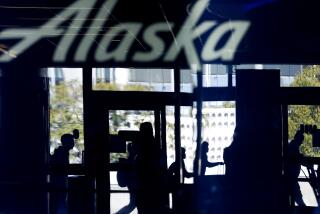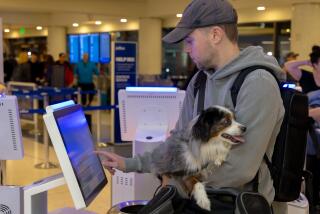Airlines’ Y2K Readiness: Blue Skies or Turbulence?
It’s nearly New Year’s Day, 2000. Do you know what your airline is up to?
It might be sending all of its top executives aloft that day. China’s airlines have been “strongly urged” by government officials to do just that. The move, of course, gives those executives the best possible incentive to take their Y2K preparation seriously.
It’s an intriguing idea, management by mortal fear. But your airline could be taking the opposite course and ordering those top executives to stay on the ground for the click-over, leaving them ready to respond to any issues that might arise. That’s the Qantas plan, as prescribed in April by chief executive James Strong.
Or maybe, since airline business is usually better on Dec. 30 and Jan. 2 anyway, your carrier is giving its work force a chance to celebrate the holiday by grounding all its planes for the transition. That’s the approach of Virgin Atlantic’s maverick leader, Richard Branson, and of LOT Polish Airlines, which will offer no flights on either Dec. 31 or Jan. 1.
The most likely scenario, however, is that your favorite airline, having spent many millions of dollars making its systems Y2K-compliant, has declared “business as usual” for the big day. Nearly every major airline around the world has taken that course.
Last month, the leading trade organization for airlines in the U.S. reported to the White House that the industry was 95% finished with its Y2K remediation measures and expected to be done by Sept. 1.
In its July 1 report, the Aviation Millennium Project (coordinated by the Air Transport Assn.) reported that it had inventoried 173 U.S. airports and surveyed more than 500. The effort identified 120 “mission-critical” airline and airport systems--from bomb-detection equipment to the Jetways that connect terminal gates to airplane hatches--that needed evaluation and perhaps revision. Of the airports surveyed, the majority reported that they had completed 90% or more of their Y2K remediation work.
Jane Garvey, the Federal Aviation Administration’s top administrator, announced several months ago that she’d be on a commercial airliner for the click-over, as a gesture of confidence in safety efforts of government and industry. Garvey and Ray Long, the FAA’s Year 2000 program office director, are booked on a Dec. 31 American Airlines flight from Washington, D.C.’s National Airport to Dallas-Fort Worth, then on to San Francisco, arriving at seven minutes after midnight, local time.
The flights are timed to put them in the air for not only midnight Eastern time and midnight Pacific time, but also midnight Greenwich Mean Time (4 p.m. Pacific time on Dec. 31), which is the basis for many air traffic control systems. (Garvey is flying American Airlines, a spokesman said, because that’s the carrier chosen by the government’s travel agency.)
On a global scale, the Y2K question seems far thornier. The International Air Transport Assn. estimates that airlines worldwide have spent $2.3 billion on Y2K upgrades since 1996. But many deep concerns remain. An exhaustive March survey by the computer consultants GartnerGroup warned of widespread or severe problems--especially in air traffic and government services--in Afghanistan, Bahrain, Cambodia, Chad, China (notwithstanding the airline executives’ proposed Jan. 1 travels), Costa Rica, Ecuador, El Salvador, Ethiopia, Fiji, Haiti, Indonesia, Kenya, Laos, Lithuania, Morocco, Mozambique, Nepal, Nigeria, Pakistan, Philippines, Romania, Russia, Somalia, Sudan, Uruguay, Vietnam, Zaire and Zimbabwe.
The U.S. State and Transportation departments have said they will post Y2K readiness reports on individual countries and international aviation conditions beginning in September. In late July, the State Department released a survey of 161 nations, finding that roughly half face a “medium to high risk” of Y2K breakdowns in their telecommunications, energy and transportation sectors. Former Eastern Bloc nations frequently turned up among those least prepared. (Aeroflot Russian International Airlines, however, has announced no New Year’s changes in its flight schedules.)
In any event, individual airlines in the U.S. and abroad still have countless decisions to make on how to face the big moment. Even for a consumer who plans to keep both feet on the ground, it’s fascinating to watch the carriers weigh potential technical vulnerability against profit potential.
At United Airlines, spokesman Matthew Triaca reports that ticket sales for New Year’s Eve and New Year’s Day are running roughly even with last year for most routes, but that winter leisure-travel hot spots, including Hawaii, are running notably ahead of last year. A spokeswoman at Delta says that carrier is seeing basically the same patterns. At American, spokesman Tim Smith says international bookings are “way ahead” of last year at this time; domestic bookings, slightly ahead. (This is no guarantee that more tickets will be sold; it may just be that millennial fanfare has prompted travelers to reserve sooner.)
Travel over the holidays may not feel like business as usual for customers of major U.S. carriers. Many carriers have bumped up prices or added restrictions to tickets to high-demand leisure destinations during the holiday period. At Delta, for instance, from Dec. 16 to Jan. 10 the carrier has added restrictions to its high-priced “unrestricted” full-fare tickets to several warm winter destinations.
Meanwhile, at Virgin Atlantic, chief executive Richard Branson has gotten wide attention for his decision to ground the carrier’s 25 planes for the hours before and following the midnight click-over. Branson has said the move is both a goodwill gesture (allowing employees to spend the occasion with family and friends) and an acknowledgment of low demand for seats during those hours.
The move makes a strange hole in Virgin’s schedule, but this decision isn’t out of character for Branson. Every year since he founded the airline in 1984, he has grounded Virgin’s planes on Christmas Day.
*
Christopher Reynolds welcomes comments and suggestions but cannot respond individually to letters and calls. Write Travel Insider, Los Angeles Times, Times Mirror Square, Los Angeles 90053, or send e-mail to chris.reynolds@latimes .com.
More to Read
Sign up for The Wild
We’ll help you find the best places to hike, bike and run, as well as the perfect silent spots for meditation and yoga.
You may occasionally receive promotional content from the Los Angeles Times.







